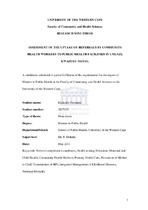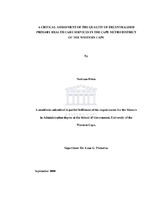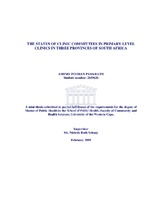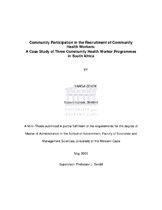| dc.contributor.advisor | Doherty, Tanya | |
| dc.contributor.author | Nsibande, Duduzile | |
| dc.contributor.other | School of Public Health | |
| dc.date.accessioned | 2014-03-17T08:56:02Z | |
| dc.date.available | 2013/05/02 | |
| dc.date.available | 2013/05/02 09:56 | |
| dc.date.available | 2014-03-17T08:56:02Z | |
| dc.date.issued | 2011 | |
| dc.identifier.uri | http://hdl.handle.net/11394/3003 | |
| dc.description | Magister Public Health - MPH | en_US |
| dc.description.abstract | Background: Globally, neonatal mortality (i.e. deaths occurring during the first month of life) accounts for 44% of the 11 million infants that die every year (Lawn, Cousens Zupan, 2005). Early detection of illness and referral of mothers and infants during the peri-natal period to higher levels of care can lead to substantial reductions in maternal and child mortality in developing countries. Establishing effective referral systems from the community to health facilities can be achieved through greater utilization of community health workers and improved health seeking behaviour. Study design: The Good Start Saving Newborn Lives study being conducted in Umlazi, KwaZulu-Natal, is a community randomized trial to assess the effect of an integrated home visit package delivered to mothers during pregnancy and post delivery on uptake of PMTCT interventions and appropriate newborn care practices. The home visit package is delivered by community health workers in fifteen intervention clusters. Control clusters receive routine health facility antenatal and postpartum care. For any identified danger signs during a home visit, community health workers write a referral and if necessary refer infants to a local clinic or hospital. The aim of this study was to assess the effectiveness of this referral system by describing community health worker referral completion rates as well as health-care seeking practices and perceptions of mothers. A cross- sectional survey was undertaken using a structured questionnaire with all mothers who had been referred to a clinic or hospital by a community health worker since the start of the Good Start Saving Newborn Lives Trial. Data collection: Informed consent was obtained from willing participants. Interviews were conducted by a trained research assistant in the mothers home or at the study offices. Road to Health Cards were reviewed to confirm referral completion. Data was collected by means of a cell phone (mobile researcher software) and the database was later transferred to Epi-info and STATA IC 11 for analysis. Descriptive analysis was conducted so as to establish associations between explanatory factors and referral completion and to describe referral processes experienced by caregivers. Significant associations between categorical variables were assessed using chi square tests and continuous variables using analysis of variance. Results: A total of 2423 women were enrolled in the SNL study and 148 had received a referral for a sick infant by a CHW by June 2010. The majority (95%) of infants were referred only once during the time of enrolment, the highest number of which occurred within the first 4 weeks of life (62%) with 22% of these being between birth and 2 weeks of age. Almost all mothers (95%) completed the referral by taking their child to a health facility. Difficulty in breathing and rash accounted for the highest number of referrals (26% and 19% respectively). None of the six mothers who did not complete referral recognised any danger signs in their infants. In only 16% of cases did a health worker give written feedback on the outcome of the referral to the referring CHW. Conclusion: This study found high compliance with referrals for sick infants by community health workers in Umlazi. This supports the current primary health care re-engineering process being undertaken by the South African National Department of Health (SANDOH) which will involve the establishment of family health worker teams including community health workers. A key function of these workers will be to conduct antenatal and postnatal visits to women in their homes and to identify and refer ill children. Failure of mothers to identify danger signs in the infant was associated with non-completion of referral. This highlights the need for thorough counseling of mothers during the antenatal and early postnatal period on neonatal danger signs which can be reinforced by community health workers. Most of the referrals in this study were neonates which strengthens the need for home visit packages delivered by community health workers during the antenatal and post-natal period as currently planned by the South African National Department of Health.Recommendations: This study supports the current plans of the Department of Health for greater involvement of CHWs in Primary Health Care. Attention should be given to improving communication between health facilities and CHWs to ensure continuity of care and greater realization of a team approach to PHC. | en_US |
| dc.language.iso | en | en_US |
| dc.publisher | University of the Western Cape | en_US |
| dc.subject | Referral completion /compliance | en_US |
| dc.subject | Health seeking Behaviour | en_US |
| dc.subject | Maternal and Child Health | en_US |
| dc.subject | Community Health Workers | en_US |
| dc.subject | Primary Health Care | en_US |
| dc.subject | Prevention of Mother to Child Transmission of HIV | en_US |
| dc.subject | Integrated Management of Childhood Illnesses | en_US |
| dc.subject | Neonatal Mortality | en_US |
| dc.title | Assessment of the uptake of referrals by community health workers to public health facilities in Umlazi, Kwazulu-Natal | en_US |
| dc.rights.holder | Copyright: University of the Western Cape | en_US |
| dc.description.country | South Africa | |




